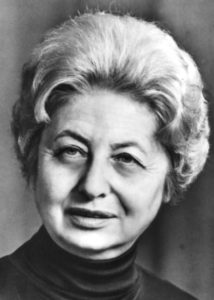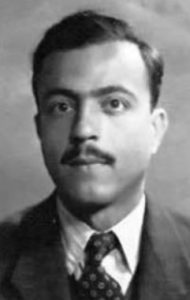In Memory of a Great Israeli Pioneer
 Tamar Finkelstein (1920-2022) was born in London, England while her parents worked there for the Jewish Agency. She returned with them to the Holy Land in 1923, at which point the family resettled in Haifa (and also Hebraized their last name to “Shoham”). Tamar Shoham became a youth leader of the Tzofim (Israeli scouts), and later joined the Haganah. For three years, she served as a signal operator and grenade maker. She returned to England to study at the University of London. At the same time, she operated a Haganah radio station and worked in the underground to assist Jews in making aliyah. During World War II, Shoham volunteered to serve in the British Army, and in 1944 was posted as an intelligence officer in Cairo. She returned to Israel in 1948 and took up a position at the Ministry of Foreign Affairs. There she would meet her second husband, Arye Eshel, who was Israel’s ambassador to Canada. After their wedding in 1960, she went by the name “Tamar Eshel”. Eshel was a frequent delegate to the United Nations, and in 1968 officially became Israel’s UN ambassador. She was appointed by the UN to head its Commission on the Status of Women, becoming the first Israeli in that position. After retiring, Eshel joined Jerusalem’s city council, and later became its deputy mayor. Around the same time, she was elected head of Na’amat, Israel’s largest women’s organization, that still has some 800,000 members today. In 1977, Eshel won a seat on the Knesset, and served as a parliamentarian until 1984. For the rest of her life, she volunteered for Hadassah Medical Center (established by former Jew of the Week Henrietta Szold), and at the Beit Tzipora women’s shelter, which she had co-founded. Eshel passed away last week on her 102nd birthday. She was Israel’s oldest former MK, and one of its most distinguished diplomats.
Tamar Finkelstein (1920-2022) was born in London, England while her parents worked there for the Jewish Agency. She returned with them to the Holy Land in 1923, at which point the family resettled in Haifa (and also Hebraized their last name to “Shoham”). Tamar Shoham became a youth leader of the Tzofim (Israeli scouts), and later joined the Haganah. For three years, she served as a signal operator and grenade maker. She returned to England to study at the University of London. At the same time, she operated a Haganah radio station and worked in the underground to assist Jews in making aliyah. During World War II, Shoham volunteered to serve in the British Army, and in 1944 was posted as an intelligence officer in Cairo. She returned to Israel in 1948 and took up a position at the Ministry of Foreign Affairs. There she would meet her second husband, Arye Eshel, who was Israel’s ambassador to Canada. After their wedding in 1960, she went by the name “Tamar Eshel”. Eshel was a frequent delegate to the United Nations, and in 1968 officially became Israel’s UN ambassador. She was appointed by the UN to head its Commission on the Status of Women, becoming the first Israeli in that position. After retiring, Eshel joined Jerusalem’s city council, and later became its deputy mayor. Around the same time, she was elected head of Na’amat, Israel’s largest women’s organization, that still has some 800,000 members today. In 1977, Eshel won a seat on the Knesset, and served as a parliamentarian until 1984. For the rest of her life, she volunteered for Hadassah Medical Center (established by former Jew of the Week Henrietta Szold), and at the Beit Tzipora women’s shelter, which she had co-founded. Eshel passed away last week on her 102nd birthday. She was Israel’s oldest former MK, and one of its most distinguished diplomats.
Words of the Week
The entire Torah was granted solely to bring about peace in the world.
– Rabbi Moses Maimonides (1138-1204), “Rambam”, Mishneh Torah, Hilchot Chanukah 4:14


